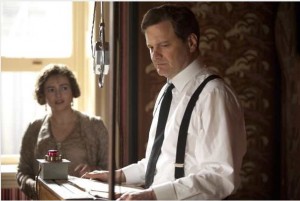 We went to see The King’s Speech yesterday. Very enjoyable film, superb script, good performances, a classic feel-good movie yet a little unusual in its pacing and subject matter. But I’m not a film critic. Two things struck me. One was that it shared a lot of subject matter with Robert Ashley’s operas. Ashley overcame a temporary speech deficiency in high school, and his doctoral research (since Ross Lee Finney prevented him from becoming a composition major) was on stuttering. The tendency of swear words to slow down speech and allow the mind to think is a theme that runs through Atalanta, Foreign Experiences, and other Ashley works, and The King’s Speech reminded me of him over and over again. King George VI uses profanity as a way of getting past his speech impediment, something that Ashley alludes to frequently:
We went to see The King’s Speech yesterday. Very enjoyable film, superb script, good performances, a classic feel-good movie yet a little unusual in its pacing and subject matter. But I’m not a film critic. Two things struck me. One was that it shared a lot of subject matter with Robert Ashley’s operas. Ashley overcame a temporary speech deficiency in high school, and his doctoral research (since Ross Lee Finney prevented him from becoming a composition major) was on stuttering. The tendency of swear words to slow down speech and allow the mind to think is a theme that runs through Atalanta, Foreign Experiences, and other Ashley works, and The King’s Speech reminded me of him over and over again. King George VI uses profanity as a way of getting past his speech impediment, something that Ashley alludes to frequently:
Instead, I learn to swear. Fuck, how simple!
It’s so mother-fucking simple. You Swear.
Instead of talking all the time, you swear.
And since foul language fucks the tempo,
The fucking thing slows down, and you start
Thinking again! [Foreign Experiences, Act III, lines 133-138]
Point two: The film’s major flaw, the one thing that jerked me out of it and deflated my suspension of disbelief, was the slapdash insertion of pieces by Beethoven in the final scenes. During King George’s historic address to the nation after Germany’s declaration of war, the background (or almost foreground) music is the slow movement of Beethoven’s Seventh. That was a little cheap, but arguably effective enough. But then, during his triumphant denouement, they play the second movement of the Emperor Concerto. First of all, the slow movement did not sound like an ending, but an inconclusive middle.* Secondly and most heinously, to celebrate this triumph of British determination over the Germans by playing German music in the background was absolutely tone-deaf (and yes, I am very well aware of the use of Beethoven’s Fifth in war-time as an Allied symbol for its dot-dot-dot-dash “V for Victory” association, but this was completely different in its effect). I could far better have accepted the Pomp and Circumstance marches as at least imbued with some cultural resonance. Instead, it was like the audience was assumed to be totally ignorant: “here’s a really touching moment, let’s throw in some classical music to make it sound appropriately solemn.” Thirdly, the scene deserved its own made-to-order music, not some DGG CD half-heartedly thrown on in the background. I had been wrapped up in the movie, and the music score ruined the ending for me completely. There’s no telling whether it was a stunning failure of imagination by the composer (Alexandre Desplat) or a resoundingly boneheaded decision by the director. But to anyone sufficiently educated to be even slightly susceptible to the cultural overtones, it was mother-fucking stupid.
*This same piece, the Emperor Concerto’s second movement, was also used for the Australian film Picnic at Hanging Rock, in which ambiguous and deceptively pastoral context it is infinitely more effective.
